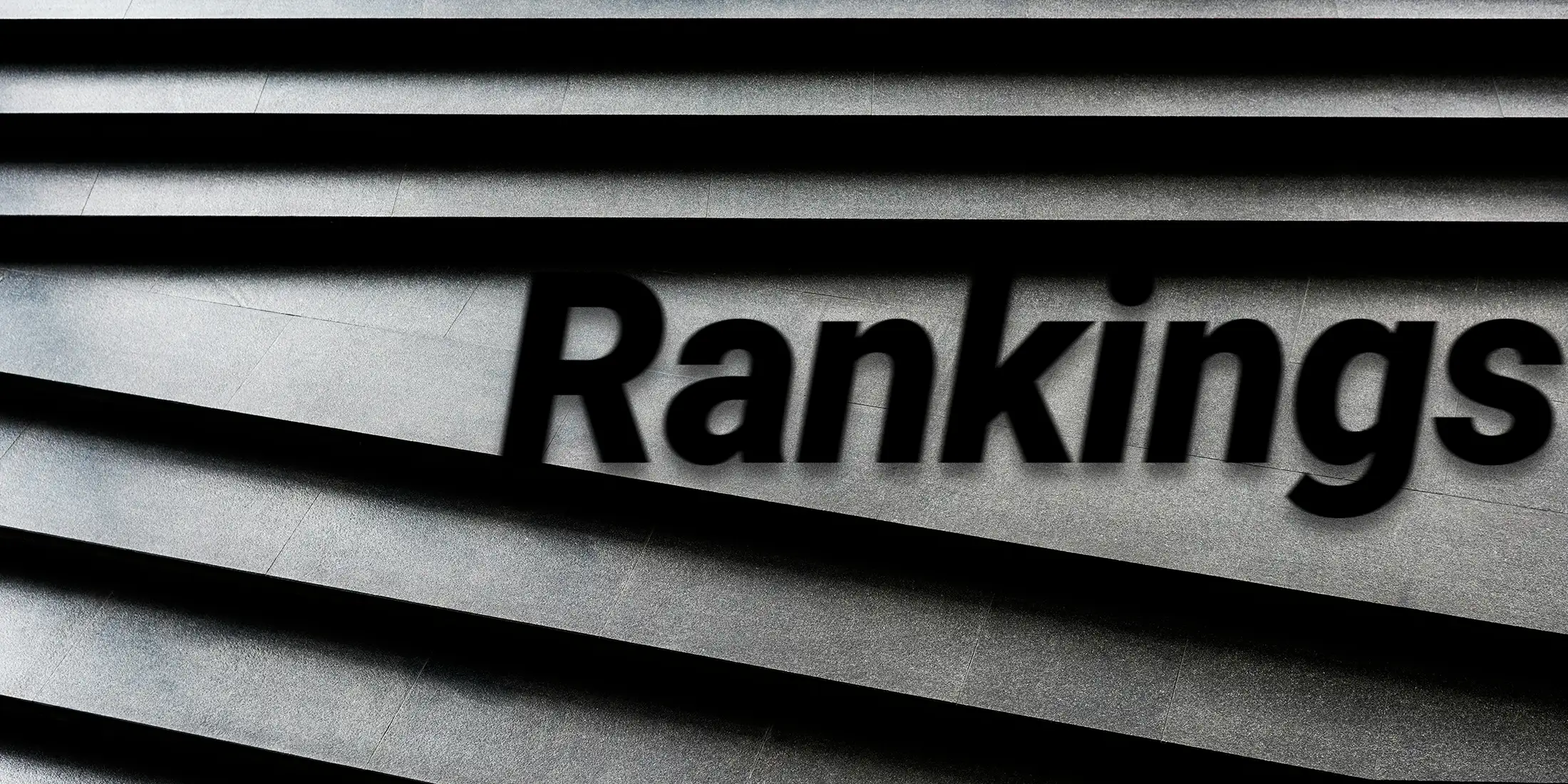The Chief Data Strategist of the U.S. News and World Report law school rankings, Bob Morse, gave a talk a few days ago about the law school rankings. One of the major topics of conversation was the impact that GRE scores for admitted students have on the U.S. News rankings. Test scores are assigned a 12.5% weight in the calculation, so there's a lot of score at stake.
Despite being a few years into those scores factoring into the methodology, there remains a great deal of confusion about how exactly GRE scores stack up to LSAT scores when calculating law school rankings. Many folks we've spoken with think that accepting GRE applicants will hurt their school's ranking. With a growing number of schools accepting the GRE, and with almost 6% of this year's law school applicants to date applying without an LSAT score (generally they are using a GRE instead), the issue of the GRE in the rankings is becoming increasingly relevant.
Inputting Test Score Medians
First a word on how the tests are scored. The LSAT is scored on a 120-180 scale, moving in 1 point increments. There is also an LSAT Writing section, which is not scored, though it is provided to law schools with applications. The GRE has three scored sections: Verbal Reasoning and Quantitative Reasoning are scored on a 130-170 scale and move up or down in 1 point increments. There is also a scored writing section, Analytical Writing, which is on a 0-6 scale and moves in half point increments.
As many people already know, U.S. News doesn't base medians' contributions to schools' rankings based on the interval scale (120-180 LSAT, 130-170 GRE) but rather on the percentile associated with each score. Both ETS and LSAC publish score conversion charts showing the interval score and its corresponding percentile, e.g. a 162 LSAT is about the 85th percentile; 155 Verbal GRE is the 68th percentile. ETS and LSAC have both made copies of their score conversion charts available online (LSAC will have recently updated their chart, though any changes will be marginal).
We would also note, in case anyone doesn't already know, that the only reported score is the highest one. This is why schools usually don't care about candidate test retakes (within reasonable limits).
GRE vs. LSAT Calculation Differences
Here’s where things get a little bit messy. How the overall GRE percentiles are calculated is different from how LSAT percentiles are calculated. LSAC provides the conversion chart showing the percentile equivalent for each 120-180 LSAT score (a 170 is a 97.5%, a 150 is a 44.7%, etc.). For the LSAT, the overall 120-180 interval score equivalent percentile is what matters. In fact, U.S. News never even sees the subsection scores for the LSAT.
An applicant can perform very well or very poorly on any one section on the LSAT, but schools and U.S. News will never know that, nor will they know the impact of such a performance in, say, Analytical Reasoning on overall score. Indirectly, ranking will be impacted by sub-section performance by raising or lowering overall score.
That is not the case for the GRE. All three sub-section scores are reported to schools and to U.S. News. U.S. News calculates the GRE in the rankings as an unequally weighted composite average of a schools three component section medians: Quantitative Reasoning (40% weight), Verbal Reasoning (40% weight), and Analytical Writing (20% weight).
Suppose there was a school with GRE medians of Verbal 160, Quantitative 155, and Writing 4.5. This school would have component percentiles of 86%, 56%, and 81%, respectively. That would total a 73% “composite” GRE, and that 73% would used to calculate rankings. FYI, that's roughly equivalent to a 158 LSAT median.
Weighting Both Tests
Part two of the ranking formula is the respective weight given to each test, LSAT and GRE. U.S. News does not favor either test in this area; it's simply proportional representation. If a school has an entering class of 90 LSAT applicants and 10 GRE applicants, then the LSAT will receive 90% of the weight, and the GRE will receive 10%. In this sense the LSAT and GRE are treated equally. U.S. News doesn't care whether a school enrolls primarily LSAT applicants, GRE applicants, or a mix of both.
Example
Here's a hypothetical. Princeton Law School has an LSAT median of 161, with 156 matriculating students having LSAT scores. Princeton's median LSAT percentile is 82.7%.
Princeton has GRE medians of 163 Verbal Reasoning, 161 Quantitative Reasoning, and 4.5 Analytical Writing, with 19 matriculating students having GRE scores. Therefore, its GRE median percentiles are 93% Verbal, 76% Quantitative, and 81% Writing.

So, based on the various GRE subsection scores, Princeton has an overall GRE composite percentile of 83.8%.
Given the number of students with each test, the LSAT would be assigned 89.1% overall weight, and the GRE 10.9% overall weight.

Princeton's total test score percentile, as calculated for use in the U.S. News rankings, would be an 82.8%. Here, the GRE helped Princeton Law raise its overall test percentile average, though only a very small amount given the relatively low proportion of matriculating students with a GRE.
Of course, it's equally possible to create scenarios where a given school's GRE medians actually decreases its average test score percentile and hurts its overall rank. Any time the “composite” GRE percentile score is higher than the percentile associated with a school's LSAT median, the GRE is going to help for the rankings. If the composite GRE percentile is below the LSAT median percentile, it'll hurt the ranking. How much either way will depend on how far it is from the LSAT median, and on how much of the entering class was admitted with a GRE versus an LSAT.
Implications
The most obvious implication of all this is that the fear of GRE matriculants inevitably hurting schools' rankings is ill-founded. Is it possible? Absolutely. The same way it's possible for low LSAT applicants to hurt rankings if they reduce a schools median. But it doesn't have to be that way. Savvy admissions departments can use the GRE to admit great candidates who will also potentially help the school's rank or add to the class in other ways, just the same way they use the LSAT.
The second is that the ratio of GRE matriculants matters, a lot. A given school can comfortably admit applicants who have GRE scores well below their overall LSAT median equivalent, so long as they keep the ratio of such admits to LSAT applicants very small. Having a few percent of students with below-median equivalent GRE scores is unlikely to have any noticeable ranking impact. Conversely, when that ratio starts to rise, schools need to be very conscientious of how exactly GRE candidates scores will impact the overall LSAT/GRE composite test score median. At present only a few schools admit enough GRE applicants to make a real difference in their test-score percentiles.
A slightly annoying side effect of this methodology is that admissions departments have to keep close track of how candidates perform on all three subsection for the GRE, how their performance in each subsection will impact overall composite GRE medians, and hence the overall test median percentile. The most obvious areas this can be problematic are in Analytical Writing scores, where percentiles drop very quickly — the difference from a 4.5 to a 4 is 24 percentile points. While test takers should do their absolute best on all sections of the test, they would be well served to take that section especially seriously given the percentile drop-off each half-point represents. This also means a bit of extra math for admissions officers throughout the year, though nothing especially arduous.
Looking Forward
Although the LSAT remains dominant, the number and percentage of GRE applicants continues to rise, as does the number of schools accepting it as a valid test for admissions. The LSAT does have a built-in advantage in that candidates with both tests on record are reported solely on the basis of their LSAT score. A change in the system to be more like undergraduate testing, where the ACT and SAT can both be considered with applicants and schools choosing which to report, would significantly change the landscape. In fact, it's easy to create a methodology where candidates taking the LSAT and the GRE could be factored into the rankings on both scores.
As the ABA increases the sophistication of non-LSAT score reporting by schools on their annual 509's, this could also help push U.S. News methodology change.
With many law schools likely facing increasing budgetary pressure, there will be plenty of motivation to seek out additional applicants. We expect a continued upward trend in the number of schools who take the GRE, which may in turn contribute to creating pressure on U.S. News and the ABA to change their approach.
Bob Morse discussed several other areas that U.S. News is either considering, or open to considering. We'll write our thoughts on those at a latter time, particularly as they relate to COVID-19's impact on the rankings.


.png)




